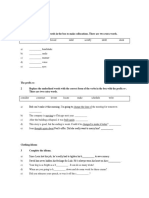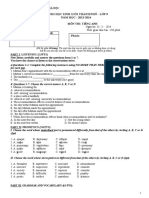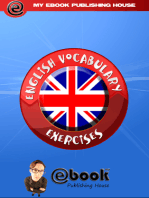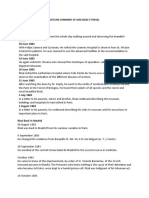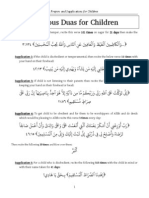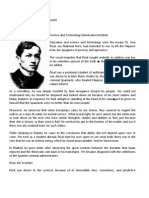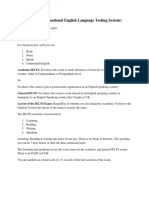GR Paper 7 (Modals)
GR Paper 7 (Modals)
Uploaded by
camilahdzCopyright:
Available Formats
GR Paper 7 (Modals)
GR Paper 7 (Modals)
Uploaded by
camilahdzOriginal Title
Copyright
Available Formats
Share this document
Did you find this document useful?
Is this content inappropriate?
Copyright:
Available Formats
GR Paper 7 (Modals)
GR Paper 7 (Modals)
Uploaded by
camilahdzCopyright:
Available Formats
Grammar Paper 7
Modals
Modal verbs
Modal verbs function as an indicator of the speaker’s (or writer’s) judgment about the likelihood
or desirability of the situation in question. They are used to express a wide range of functions
and meanings.
7.1. FORM
7.1.1 Complete the chart below.
can must should have would want
to rather
It is followed by the
base form of the verb
There is no special third
person form
The negative is formed
by simply adding ‘not’
The question is formed
by inversion
It cannot be preceded
by auxiliaries
It’s form changes in the
past
It is not preceded by
‘to’
The past is formed by
adding have + past
participle of the verb
Note: There are three negative forms of can: can’t cannot can not
7.1.2 Are the sentences correct (C) or incorrect (I) (1.5)?
1. ___ You should try to answer politely.
2. ___ Everyone must leaves the room immediately.
3. ___ You could have taken a vacation last week.
7.1.2.a Choose the correct negative form (0.5):
a. You shouldn’t eat a lot of sweet things.
b. You don’t should eat a lot of sweet things.
7.1.2.b Choose the correct question form (0.5):
a. Do I should drink coffee?
b. Should I drink coffee?
Teacher’s Diploma Program 1
Grammar Paper 7
Modals
7.1.3. Use verbs from the box to complete the sentences (3).
do get go make pass play
1. Can you __________ the piano? 4. Must you __________ so much noise?
2. I want __________ shopping. 5. Could you __________ the salt?
3. We should _________ our homework. 6. We ought __________ our tickets first.
7.1.4 Match the sentence halves (2.5).
1. ___ Can you ... a) close the door, please?
2. ___ Could you ... b) closing the door, please?
3. ___ Would you mind ... c) lend me twenty dollars, please?
Can and could are followed by ...
Would you mind is followed by ...
7.2 USE
7.2.1 CAN: A SINGLE STRUCTURE, A VARIETY OF USES
7.2.1.1 Classify the following examples in the chart below. Write the letters in the
box. (3.5).
a. We can meet outside the library.
b. Can you bring your laptop with you?
c. I can’t talk to you right now.
d. I can’t insert a picture into my document – I don’t know how!
e. Can you download music from your computer?
f. I can’t open this document – I don’t have the right program.
g. Can you burn DVDs?
Talking about abilities or Saying (or asking) if Asking someone to do
things people (don’t) something is possible. something.
know how to do.
7.2.1.2 How good are you? Complete the chart. Use a check mark ( ).
Can you … Yes No
… install new software in your computer?
… download clipart?
… send text messages?
… burn CDs?
… record DVDs?
… download MP3s?
Teacher’s Diploma Program 2
Grammar Paper 7
Modals
7.2.1.3 Talking about possibilities. Match the questions and answers (3).
1. ___ What can you do in Mexico City? a. Yes, and you can take a tour on a
double-decker bus, too
2. ___ Can you take a walking tour? b. Well, you can go to the Museum of
Anthropology.
3. ___ What historic sites can you visit? I c. Yes, there’s a pyramid in downtown
mean, can you go to a pyramid? Mexico City.
4. ___ Where can you go on a rainy day? d. You can do a million things.
5. ___ What kinds of museums can you go e. Yes, you can go to the top of the Torre
to? Mayor.
6. ___ Where can you get a good view of f. You can go shopping, or go to a
the city? I mean, can you go to the top museum.
of a tall building?
7.2.2 MAKING A REQUEST AND GIVING OR DENYING PERMISSION
7.2.2.1 Find out how polite you are.
Quiz 2. You’re having dinner with some
How polite are you?
friends and you want some hot
sauce. What do you say?
a. Could you pass the hot
sauce, please?
b. Hot sauce.
1. You want to use your friend’s phone. 3. You can’t hear what your friend is
What do you say? saying on the phone. What do you
a. Where’s the phone? say?
b. Could I use your phone? a. Say again.
b. Could you say that again?
7.2.2.2 Are the following statements True or False (1)?
True False
a. We use Could + I + base form to ask for things.
b. We use Could + ______ + base form to ask other people to do things.
7.2.2.3 Match the questions with the answers. Write G next to the responses giving
permission and R next to the responses denying permissions. (3).
1. ____ Could I use your phone, please? ____ a. Yes, of course.
2. ____ Is it OK if I sit here? ____ b. No, not at all.
3. ____ Would you mind if I leave early? ____ c. I’m sorry, but this seat is taken.
4. ____ Do you mind if I check my e-mail? ____ d. Sure, go ahead.
5. ____ Could you say that again, please? ____ e. No, I’m sorry. We need you here
today.
Which phrase is more formal?
Teacher’s Diploma Program 3
Grammar Paper 7
Modals
7.2.4 EXPRESSING PERMISSION AND PROHIBITION
7.2.4.1 Explain what each sign says you can do, are (not) allowed to do, mustn’t or
can’t do (3).
••
1. ____________________________. 4. ____________________________.
2. ____________________________. 5. ____________________________.
3. ____________________________. 6. ____________________________.
7.2.4.2 Read the following paragraph and answer the questions that follow (1).
In 1962, Nelson Mandela, a leader of the African National Congress (ANC) was sentenced to
life imprisonment. The ANC fought against the idea of apartheid, a system in South Africa
which didn’t give black people the same rights as white people.
In his autobiography he wrote:
They only let me write one letter every six months. It was one of the facts of
prison life. In prison, the only things worse than bad news about one’s family
is no news at all. Often the authorities would keep mail out of spite. I can
remember prison guards saying, “Mandela, we have received a letter for you,
but we are not allowed to give it to you.” No explanation of why, or who the
letter was from.
adapted from Long Walk to Freedom by Nelson Mandela
Which phrase expresses permission? ______________
Which phrase expresses prohibition? ______________
7.2.4.3 Complete these statements with make or let or not allowed (2.5).
1. Mandela’s prison guards ___________________ (exercise) for only 30 minutes a day,
under strict supervision.
2. Mandela’s life in prison was very difficult. They __________________ (stay) in a very
small cell.
3. Some of Mandela’s guards were compassionate. They didn’t __________________
(work) when he was sick.
4. While he was in prison, they __________________ (break) stones with a hammer.
5. The prisoners ___________________ (talk) while working.
Teacher’s Diploma Program 4
Grammar Paper 7
Modals
7.2.5 OFFERING TO HELP, AND ACCEPTING OR REFUSING HELP.
7.2.5.1 Match the two parts of the conversations. Write A next to the responses
accepting help and R next to the responses refusing help (2.5).
1. ____ Why don’t you let a. Thanks. I need to get home early tonight. __
me carry your bags?
2. ____ I don’t think I can b. Don’t worry about it. I’m fine. I ate about __
reach the button. an hour ago.
3. ____ Would you like c. They are very heavy. Thanks. __
some help with your
homework?
4. ____ Can I help you fill in d. Allow me. I’ll press it for you. __
those forms?
5. ____ Shall I make you e. No, thanks, I can do it by myself. __
something to eat?
7.2.5.2 Complete the requests or offers with words from the box (2.5).
Can you Could you Could you
I’ll Should I Would you like me to
1. A: ________________________ make the hotel reservations for the trip?
B: Yes, thanks.
2. A: ________________________ arrange a meeting with Ms. Levine at EDBM, please?
B: Of course.
3. A: ________________________ send an e-mail telling everyone about the meeting?
B: Of course. ________________________ do it right away.
4. A: ________________________ make the copies now or later?
B: Later is fine.
7.2.6 GIVING A WARNING OR STRONG SUGGESTION
7.2.6.1 Complete each conversation with had better or had better not. Use
contractions (1).
1. A: Is the museum very far from here? 2. A: When does the meeting begin?
B: Yes, you _____________ take a taxi. B: At two o’clock sharp.
We _____________ be late.
7.2.7 EXPRESSING OBLIGATION, NECESSITY, OR GIVING ADVICE
7.2.7.1 Look at the examples on the following page. Which word in bold (2.5):
1. ____ tells us that something is essential?
2. ____ suggests that something is a good idea?
3. ____ says that something isn’t necessary?
4. ____ describes a responsibility?
5. ____ says that something is a possibility?
Teacher’s Diploma Program 5
Grammar Paper 7
Modals
a. Teachers should relate their lessons to their learners in a meaningful way.
b. Teachers have to know how grammar works.
c. Encouraging learners to discover how grammar works may mean changing your style.
d. Teachers must plan their lessons well.
e. Experienced teachers who say they don’t need to plan lessons any more couldn’t be
more wrong.
7.2.7.1.a Which word in italics in the sentences above could be replaced by:
1. don’t have to? _____
2. might / could? _____
3. ought to? _____
7.2.7.2 Classify the following examples. Write the letters in the box (3.5).
a. You must have a driver’s license.
b. You’d better avoid the stalls on the street.
c. You have to get a passport.
d. You should try some local specialties.
e. You shouldn’t carry a lot of cash.
f. You mustn’t drink tap water.
g. You ought to pack a first aid kit.
Expressing obligation or absolute Giving advice
necessity
7.2.7.4 Choose the sentence closest in meaning (2.5).
1. Do you think the Apple Tree is a good place to stay?
a. Do you think I should stay at the Apple Tree?
b. Do you think I have to stay at the Apple Tree?
2. If you don’t have your luggage ticket, the bellman won’t give you your luggage..
a. You could give the bellman the ticket.
b. You must give the bellman your ticket.
3. They don’t accept credit cards in this amusement park. They only accept cash.
a. You have to pay with cash.
b. You’d better pay with cash.
4. When I made a reservation, I asked for a suite.
a. They mustn’t give me a suite.
b. They’re supposed to give me a suite.
5. Don’t go in the pool unless there is a lifeguard.
a. You mustn’t go in the pool unless there’s a lifeguard.
b. You don’t have to go in the pool unless there’s a lifeguard.
Teacher’s Diploma Program 6
Grammar Paper 7
Modals
7.2.3.6 Complete the following sentences about men’s rules for successful dating.
Use have to, must, cannot, mustn’t (5).
1. You ____________ arrive on time for dates – women hate it when you keep them waiting.
2. On her birthday, you ____________ give a woman a gold ring – she’ll think you want to
marry her. Be safe – give her flowers.
3. You ____________ pay when you go out. Women want to be equal, but not that equal!
4. You ____________ be funny. You may be good-looking, well-dressed, and have the brains
of Einstein, but if you can’t make them laugh, forget it.
5. You ____________ talk about other beautiful women, even famous movie stars. Years
later, she’ll still make comments about it.
Wise men talk because they have something to say;
fools, because they have to say something.
Plato
Have to / don’t have to are sometimes called phrasal modals. They change form to agree
with the subject and can express present, past and future.
I have to work long hours. And I have to get up early almost every day.
I don’t have to get up early tomorrow, though.
7.2.7.3 Are the following statements True or False (1)?
True False
a. Have to expresses obligation.
b. Have to suggests there is no other choice of action.
c. Don’t have to also expresses obligation.
d. Have to is often pronounced / hævtə /.
7.2.7.5 Complete the sentences with the correct form of have to / don’t have
to (1).
I’m a waiter, so I _____________ take orders and serve customers. I
_____________ work in the kitchen; I only serve food and drink. I always
_____________ be polite to the customers.
7.2.7.6 Write the job next to each picture. What do people have to do / not have to
do in each one (2)?
Teacher’s Diploma Program 7
Grammar Paper 7
Modals
7.2.8 INVITING, SUGGESTING
7.2.8.1 Which of the following are invitations (I)? Which are suggestions (S) (1.5)?
a. ____ Would you join us for dinner?
b. ____ Let’s try the Hong Kong Cafe.
c. ____ Shall we go to the movies?
Note: In modern English, shall is only used in suggestions and offers, with we
and I.
Shall we go to the movies? Shall I open the window?
Let’s go to the movies, shall we?
7.2.9 MAKING REQUESTS AND OFFERS
7.2.9.1 Which of the following are requests (R)? Which are offers (O) (3)?
1. Can you call the restaurant, please? ___
2. Could you get a photocopy of this, please? ___
3. Would you like me to arrange a meeting for you? ___
4. Should I call a taxi? ___
5. Could you answer the phone? ___
6. What would you like to drink? ___
7.2.9.2 Which of the following pairs of phrases is more polite (2)?
1. a. Would you answer the phone? 3. a. Pass me some sugar, please.
b. Answer the phone. b. Would you mind passing me some
sugar?
2. a. Can you close the door?
b. Close the door. 4. a. Could you please turn down the radio?
b. Turn down the radio.
7.2.10 EXPRESSING PREFERENCES
7.2.10.1 Take the following work preference inventory. Check the activities you
would like to do.
I’d like to …
work on experiments in a laboratory
write songs
study a company’s sales
start my own business
build houses
be a doctor and care for sick people
Teacher’s Diploma Program 8
Grammar Paper 7
Modals
7.2.10.2 Complete the conversations with would and the appropriate form of the verb
in parenthesis (2).
1. A: __________ you prefer __________ a course in computers or in cooking? (take)
B: I’d prefer __________ for a course in computers because it’s more useful for me.
(register)
2. A: __________ you rather __________ in the morning or in the evening? (study)
B: To tell the truth, I’d prefer __________ classes in the evening, after work. (take)
7.2.11 Write an example and complete the pie chart, showing the form and use (2).
FORM MEANING
now
How is it What does it
formed? mean?
Accuracy Meaningfulnes
s
USE
When and why is
it used?
Appropriateness
7.3 MEANING
Modals are used for social interaction, and the person using them must take into account the
social situation. On the other hand, modals also express logical probability. In the sentence “It
may rain tomorrow,” there is no need to know about the social situation. They are used when
the speaker is speculating about something based on logic and facts as understood by the
speaker, independently of the social situation. This means that meaning and use of modals are
taught separately, since in most cases they are not interrelated.
7.3.1 Classify these modals according to the degree of certainty (3.5):
1. It can be quite rainy this time of year.
2. You can’t be hungry! You just ate.
3. I may have to leave early.
4. Antonio got A’s in all his classes. He must be very smart.
5. It can’t be midnight already! It seems like we just got here.
6. We should be there in twenty minutes unless there’s a traffic jam.
7. It might be too late to call John. He usually goes to bed early.
less certain more certain
Teacher’s Diploma Course 9
Grammar Paper 7
Modals
7.3.1.1 Look at the pictures. Draw a conclusion and complete the sentences with
phrases from the box below (1.5).
must must not
He ___________ be cold. He ___________ have a He ___________ like the
toothache. dark.
7.3.1.2 Complete the sentences with phrases from the box below (2).
must be might be can’t be
1. You worked until midnight? You __________ exhausted today!
2. The baby __________ hungry again – I just fed her!
3. Rob just called from the airport. His plane __________ a little late.
4. It __________ hard to get tickets to that concert. Everyone wants to go.
What’s the opposite of That can’t be right?
7.2.11 Write an example and complete the pie chart, showing the form and meaning
(2).
FORM MEANING
How is it What does it
formed? mean?
Accuracy Meaningfulnes
s
USE
When and why is
it used?
Appropriateness
Teacher’s Diploma Course 10
Grammar Paper 7
Modals
7.4 PAST MODALITY
For all sad words of tongue or pen
The saddest words are these: “It might have been.”
John Greenleaf Whittier
The great Shakespeare controversy:
who really wrote Romeo and Juliet?
William Shakespeare, England’s greatest writer, was responsible for 39 plays and some of the
most fantastic poetry ever written. He was born in Stratford-upon-Avon on April 23, 1564.
Later he went to London, where he wrote, and acted in, plays such as Romeo and Juliet,
Macbeth, Hamlet, and the Tempest. He died in Stratford in 1616, but movies are still being
made about him and his work 400 years later.
However, some people don’t believe that William Shakespeare of Stratford could have written
the plays. They say he wasn’t well-educated enough to know about all the things mentioned
in the plays. Besides, there are no manuscripts in Shakespeare’s handwriting, and his name
didn’t even appear on many of the plays until after his death.
One group of people argue that the plays must have been written by Edward de Vere, the Earl
of Oxford. He wasn’t allowed to use his own name because he was an aristocrat and so he
chose Shakespeare as a pseudonym.
Some people copy the work of famous writers, like Shakespeare, or artists, like Picasso.
7.4.1 MEANING
7.4.1.1 Match the sentences on the right with the sentence on the left that best
explains what it means (4).
a. ___ Shakespeare can’t have written that play. 1. I am sure he wasn’t poor.
It’s not his style.
b. ___ Someone might have used his name. 2. It is certain that he was.
c. ___ Shakespeare must have been a very good 3. It is impossible that anyone
playwright. else did it.
d. ___ Shakespeare might have written this play. 4. It’s not possible that he painted
The words sound like his. it.
e. ___ Picasso couldn’t have painted this picture. 5. It’s possible that someone did.
f. ___ Paula King, a famous woman forger, could 6. It’s possible that he did.
have copied his style.
g. ___ I don’t think anyone but Picasso could have 7. It’s not possible that he did it.
painted it!
h. ___ Picasso sold a lot of paintings during his life. 8. It’s possible that she did.
He must have been very rich.
Teacher’s Diploma Course 11
Grammar Paper 7
Modals
7.4.2 USE: EXPRESSING REGRETS
7.4.2.1 Which sentence tells us what really happened (2.5)?
1. I shouldn’t have called him.
a. I called him.
b. I didn’t call him.
2. My parents ought to have moved away from that neighborhood.
a. They’re going to move, but they’re not sure when.
b. Moving was a good idea, but they didn’t do it.
3. I should have told them what I thought.
a. I didn’t tell them, and now I regret it.
b. I told them, and that was a big mistake.
Other functions of past modals are similar to those of conditionals (Grammar Paper 11).
TOTAL: 74.5 points
Teacher’s Diploma Course 12
Grammar Paper 7
Modals
You might also like
- Panel Discussion RubricDocument2 pagesPanel Discussion RubricA-r Samsico100% (8)
- English: Quarter 2 - Module 7Document10 pagesEnglish: Quarter 2 - Module 7LornaNo ratings yet
- CP English Test - 2020-21 - Módulo 1Document5 pagesCP English Test - 2020-21 - Módulo 1Paulo AmaralNo ratings yet
- Placement TestDocument3 pagesPlacement Testkolya viktorNo ratings yet
- Holiday Vibes - KopiaDocument10 pagesHoliday Vibes - KopiaJagoda GaniaNo ratings yet
- Toeic Speaking Wk2Document6 pagesToeic Speaking Wk2ChuoiEmNo ratings yet
- English Worksheet 1 (Grade 6 Ekam & Ena (24-03-2018)Document3 pagesEnglish Worksheet 1 (Grade 6 Ekam & Ena (24-03-2018)Rohit JadhavNo ratings yet
- ModalsDocument5 pagesModalsJuliaSabrinaSuarezNo ratings yet
- Exam EVOLVE 4CDocument7 pagesExam EVOLVE 4CCecy Cervantes100% (1)
- Examen n7 (Type 1)Document8 pagesExamen n7 (Type 1)Silva Martinez Silvia JacquelineNo ratings yet
- Escrituras de Casa de DubaiDocument10 pagesEscrituras de Casa de DubaiCaRlOs GaMeZNo ratings yet
- TRABAJODocument8 pagesTRABAJOmarcoNo ratings yet
- CP English Test - 2020-21 - Módulo 1 - CorrectionDocument5 pagesCP English Test - 2020-21 - Módulo 1 - CorrectionPaulo AmaralNo ratings yet
- Scenario 1 To 4Document5 pagesScenario 1 To 4Sneider AriasNo ratings yet
- Outstanding 2 Unit4 WorksheetDocument4 pagesOutstanding 2 Unit4 WorksheetJoao ALONZO LEONNo ratings yet
- Summative and Performance Test Q1 No.4Document18 pagesSummative and Performance Test Q1 No.4Rosendo AqueNo ratings yet
- Revision Worksheet 6 - B1 MC 2023-24 SpringDocument4 pagesRevision Worksheet 6 - B1 MC 2023-24 SpringYeditepe CopyNo ratings yet
- Guided Discovery-Task TypesDocument4 pagesGuided Discovery-Task TypesChatta Neeladevi100% (1)
- Our First Meeting.Document4 pagesOur First Meeting.andresNo ratings yet
- Scenario 5 To 8Document3 pagesScenario 5 To 8erika tarazonaNo ratings yet
- English I: SubjectDocument4 pagesEnglish I: SubjectAlvarez AlejoNo ratings yet
- ModalsDocument9 pagesModalsalexd6489No ratings yet
- Ulangan Semester Genap T.A 2015/2016 Name: Class: IvDocument3 pagesUlangan Semester Genap T.A 2015/2016 Name: Class: IvIrena marianaNo ratings yet
- Asynchronous Offline Efdt Learning PlanDocument9 pagesAsynchronous Offline Efdt Learning PlanFairyLeen PitogoNo ratings yet
- Esau 1Document3 pagesEsau 1Ana Gabriel SáncheziNo ratings yet
- Modals1 PDFDocument5 pagesModals1 PDFbrankosija0% (1)
- Booklet 2024Document56 pagesBooklet 2024soldelparanaNo ratings yet
- LCE001 FormaA 04072018 111740Document6 pagesLCE001 FormaA 04072018 111740Claudio HenríquezNo ratings yet
- Apostila LA112 2024 - 2Document89 pagesApostila LA112 2024 - 2João Victor AndradeNo ratings yet
- Local 9th GradeDocument7 pagesLocal 9th GradeNina StefanoskaNo ratings yet
- Anh 6 Review 1,2, Key Review 1,2Document26 pagesAnh 6 Review 1,2, Key Review 1,2Minh TôNo ratings yet
- Final Test: Listen To Paulo and Georgia Talking. Check ( ) The Correct Answers. (2 POINTS)Document4 pagesFinal Test: Listen To Paulo and Georgia Talking. Check ( ) The Correct Answers. (2 POINTS)Rawsht MuradyNo ratings yet
- Scenario 5 To 8Document3 pagesScenario 5 To 8Cristian camilo Gutierrez VargasNo ratings yet
- Grammar Blue Term 2 MidtermDocument7 pagesGrammar Blue Term 2 MidtermdianalovesunityNo ratings yet
- Unit 8, Lesson 2 Reinforcement: Unit 8 (Shopping and Clothes)Document10 pagesUnit 8, Lesson 2 Reinforcement: Unit 8 (Shopping and Clothes)Adriana SanchezNo ratings yet
- WHLP English Grade 9Document33 pagesWHLP English Grade 9Nimfa SeparaNo ratings yet
- Grade 9 Summative Q1Document4 pagesGrade 9 Summative Q1Sharon Rose RamosNo ratings yet
- Worksheet No. 31: A. A. B. C. D. A. B. C. D. A. B. C. D. A. B. C. D. A. B. C. DDocument8 pagesWorksheet No. 31: A. A. B. C. D. A. B. C. D. A. B. C. D. A. B. C. D. A. B. C. DTuan Son NguyenNo ratings yet
- Activity Sheets (MODALS)Document5 pagesActivity Sheets (MODALS)Jelina Oclarit MolinaNo ratings yet
- Workbook Top Notch 2Document46 pagesWorkbook Top Notch 2Luisa MartinezNo ratings yet
- Consolidation 5-8 ADocument4 pagesConsolidation 5-8 AGábor SzekeresNo ratings yet
- Actividad 1 Ingles1Document5 pagesActividad 1 Ingles1Oscar Felipe CHITO CAJASNo ratings yet
- Guide 7TH. Partial ExamDocument6 pagesGuide 7TH. Partial ExamOscar Arshavin0% (1)
- English Review-Mid Semester Grade 1Document4 pagesEnglish Review-Mid Semester Grade 1hugosportivo02No ratings yet
- Interrogative Pronouns WorksheetDocument5 pagesInterrogative Pronouns WorksheetZahariah Zainal AbidinNo ratings yet
- Module 3 ActtDocument58 pagesModule 3 ActtAnjhali ReyesNo ratings yet
- Training Test EliasDocument4 pagesTraining Test EliasEDISON XAVIER CANAR CHARIGUAMANNo ratings yet
- 2 ENGLISH WORKSHEET Command and RequestDocument2 pages2 ENGLISH WORKSHEET Command and RequestTASIRIH TASIRIHNo ratings yet
- ĐỀ THI HSG ANH HÀ NỘI 2013 2014Document6 pagesĐỀ THI HSG ANH HÀ NỘI 2013 2014Vô DiệnNo ratings yet
- Our First Meeting. (TefyDocument4 pagesOur First Meeting. (TefyEstefania R.cNo ratings yet
- Subject: English IDocument4 pagesSubject: English IAna Carolina RIVAS ANDRADENo ratings yet
- Tiếng Anh 6Document8 pagesTiếng Anh 6Duyên TrầnNo ratings yet
- 5915e761ef0166.05641860Document4 pages5915e761ef0166.05641860ky2rkzh7wyNo ratings yet
- Ficha 4Document2 pagesFicha 4kfhuamanhuNo ratings yet
- American Headway 4 - Units 5 and 6Document3 pagesAmerican Headway 4 - Units 5 and 6Kenia Gabiatti GomesNo ratings yet
- Chapter 08 XDocument6 pagesChapter 08 XAodabe GarciaNo ratings yet
- 10-AS-INGLES-Udproco-10th-Recuperación Segundo Periodo WORD-1749635434-156861082Document7 pages10-AS-INGLES-Udproco-10th-Recuperación Segundo Periodo WORD-1749635434-156861082sergioNo ratings yet
- Quiz Unit 9-16Document4 pagesQuiz Unit 9-16p1nk BubbleNo ratings yet
- XI KlasiDocument5 pagesXI Klasiთამუ ბაჯელიძეNo ratings yet
- Nook Free TemplateDocument13 pagesNook Free TemplateStephani AnggitaNo ratings yet
- ProjectsDocument3 pagesProjectsJoy DasNo ratings yet
- XII W.S. PPT of INVITATION AND REPLIESDocument20 pagesXII W.S. PPT of INVITATION AND REPLIESzahir khanNo ratings yet
- Parts of Speech FreeDocument26 pagesParts of Speech FreeSheetal100% (1)
- Travels of RizalDocument18 pagesTravels of Rizalandrec coletNo ratings yet
- Euro Symbol in PDFDocument2 pagesEuro Symbol in PDFGloriaNo ratings yet
- Duas To Cure Temper PDFDocument4 pagesDuas To Cure Temper PDFAatif ZaidiNo ratings yet
- Free Arabic Lesson - Lesson 1 - Greetings - Learn Arabic With L-Ceps Language Learning Breakthrough PDFDocument4 pagesFree Arabic Lesson - Lesson 1 - Greetings - Learn Arabic With L-Ceps Language Learning Breakthrough PDFakhil100% (1)
- Arg AjmerDocument76 pagesArg AjmerSandalee MathurNo ratings yet
- 05 1111 02 5RP AFP tcm143-479901Document8 pages05 1111 02 5RP AFP tcm143-479901Chitrah R70% (10)
- Rizal's Works in Science and TechnologyDocument6 pagesRizal's Works in Science and TechnologyBeverly Reyes Arroyo0% (1)
- Suggested Refresher ActivitiesDocument6 pagesSuggested Refresher ActivitiesBeverly UriarteNo ratings yet
- Fill in The Gaps With A Suitable Modal Verb.: Name: - DateDocument4 pagesFill in The Gaps With A Suitable Modal Verb.: Name: - DateMariaNo ratings yet
- Theme For English BDocument5 pagesTheme For English Bapi-404427385No ratings yet
- Communication SkillDocument10 pagesCommunication SkillShivani YadavNo ratings yet
- PsycholinguisticsDocument8 pagesPsycholinguisticsRaza ShahNo ratings yet
- Alfred de Lazzero: Personal Details ExperienceDocument1 pageAlfred de Lazzero: Personal Details ExperienceAnonymous nyiKHSMcZyNo ratings yet
- English 2 Quarter 3 Week 2Document6 pagesEnglish 2 Quarter 3 Week 2MARY ANN PIQUERONo ratings yet
- Encounters - de La Salle at ParmenieDocument90 pagesEncounters - de La Salle at ParmenieLelouch LamperougeNo ratings yet
- The Role of Context in Interpretation: Reference Presupposition Implicatures InferenceDocument24 pagesThe Role of Context in Interpretation: Reference Presupposition Implicatures InferenceAlphahin 17No ratings yet
- CDI 5 Tech Revised 2Document141 pagesCDI 5 Tech Revised 2Lovely-Lou LaurenaNo ratings yet
- IELTS Notes by Syed Ali HussainDocument11 pagesIELTS Notes by Syed Ali HussainPhysiotherapist AliNo ratings yet
- Reflection Essay: Nature of LanguageDocument2 pagesReflection Essay: Nature of LanguageSpice Morales100% (1)
- AI NotesDocument121 pagesAI NotesSalini Suresh50% (2)
- Inky PinkyDocument12 pagesInky PinkyshivakumarmNo ratings yet
- Philippine LiteratureDocument21 pagesPhilippine LiteratureCris Marie RagayNo ratings yet
- GET SMART BEFORE YOU START. - Culture and PeopleDocument18 pagesGET SMART BEFORE YOU START. - Culture and PeopleNAHIKARI PANIAGUA ANITUANo ratings yet
- Filipino English WordsDocument13 pagesFilipino English WordsAnton Colasi CorulloNo ratings yet
- 10th-English-Centum-Special-Question-Paper-to-Public-Exam-2022-English-Medium-PDF-DownloadDocument4 pages10th-English-Centum-Special-Question-Paper-to-Public-Exam-2022-English-Medium-PDF-Downloadreginastephen2020No ratings yet










































